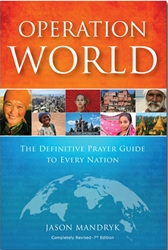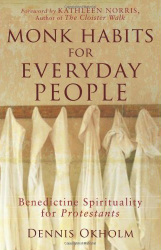posts
|
After nearly a decade, the latest edition of Operation World: The Definitive Prayer Guide to Every Nation has been released. As the title indicates, it is a well-researched and rich resource that facilitates informed prayer for every people in the world. I have enjoyed using the paperback edition during my daily devotions. This week I was particularly burdened to pray for salvation, healing, and rescue for the 30 million victims of human trafficking, 80% of whom are women and children. Also, I was reminded to pray for 2252 cultural groups that still do not have the Bible in their first language. The book is organized with a calendar so that individuals can pray for a country everyday. Our church is also following OW for prayer in our small groups. Aside from the paperback version, you can also sign up to receive daily email prayer updates and access other prayer resources.
In personal and group prayer, let us pray with the Psalmist: "[God] that your way will be known on earth, your saving power among all nations. Let the peoples praise you O God; let all the peoples praise you" (Psalm 67:1b-2). Over the past couple of months, I have enjoyed reading Dennis Okholm's book Monk Habits for Everyday People: Benedictine Spirituality for Protestants. Okholm is an evangelical who shares his experience of coming to appreciate and apply aspects of the Rule of St. Benedict in his own Christian journey. In addition, he attempts to make the spiritual values of Benedict of Nursia (480-547)--an Italian monk and innovative monastic abbot--accessible to modern Protestants. As a student of early Christianity, I have spent a number of years studying and reflecting on the spirituality and ministries of a number of monks, including Antony, Pachomius, Martin of Tours, Basil of Caesarea, Augustine, Evagrius, John Cassian, Columba, and Columban. I've particularly enjoyed those who labored as monk-pastors or monk-missionaries--those who effectively combined the contemplative (prayer, Scripture reading) and active (preaching, teaching, writing) aspects of the Christian life. So, this interaction with Benedict and his Rule (RB)--contextualized for modern evangelical Protestants--was quite welcomed. Though I will not attempt a complete review of the book here, I would like to make a series of posts discussing short devotional nuggets from the book.
In chapter 8, Ockholm discusses Benedict's value of spiritual reading (lectio divina). In RB 48, Benedict prescribes a balanced day that included 6 hours of work, 3 hours in spiritual reading (the Scriptures), and 4 hours for prayer. The prayer times (liturgy of the hours) were spread throughout the day (morning, noon, evening, night)--kind of like spiritual "meal times"--so, don't worry, it wasn't 4 hours of straight prayer. What got my attention most in this chapter was the approach to reading Scripture. Ockholm writes, "[spiritual reading] prepares one for community prayer. It is slow meditative reading. For example, one might begin reading a New Testament epistle until she comes to a particular verse or phrase that captures her attention; she stops, reflects on the passage until her mind begins to wander, and then moves on in the passage until she comes to rest at another phrase." He continues, "[spiritual reading] is not the same as reading the Bible through in one year. . . [spiritual reading] is not 'reading by the pound' . . . it demands that the reader approach the Bible as a pray-er, rather than as a consumer" (Ockholm, 107). Having just committed to reading the Bible through this year with my church and small group (I'm following this reading plan), I wonder, is it possible to read through that much Scripture (3-4 chapters a day) in a contemplative way? I think so, and here are some principles and strategies that I'm following: 1. Set aside enough time everyday (at least 30 minutes) to read in an unhurried manner. 2. I like starting with the Psalms (my reading plan contains Psalms, Pentateuch, historical books, NT), which helps me begin to read prayerfully. 3. Maintain the discipline of reading everyday. It really gets discouraging when we get behind. The pressure to catch up often short circuits contemplate reading. 4. That said, let prayerful meditation be the priority over finishing the passages and "checking the box" (literally). I would rather stop at the first verse of my reading, pray and meditate over it, and have application for my day than walk away with 4 chapters read and nothing to take into the day. 5. If the schedule is rushed, consider reading Scripture the way the Benedictines pray: read a chapter in the morning, another at lunch time, another on an afternoon break, and a final one at bedtime. 6. If we get behind and don't read for a week, don't quit. Pick back up with today's schedule. 7. Encourage and be encouraged by others who are reading daily. More than simply asking, did you do your reading today? Ask instead, how did God speak to you in the Word today? How is it transforming you in your home, family, relationships, and work? 8. Don't just read Scripture silently. Read it aloud (as much of it was meant to be anyway) or consider listening to it read aloud. 9. Here's a wild one that cuts against our individualism. Pick a day and read Scripture with a friend or small group and then pray together. When representatives of the American Bible Society reached Brazil in around 1816, it marked not only the beginning of Bible distribution in both the country and in Latin America as a whole, but it also signified the beginning of a significant wave of evangelical Protestant missions which was spread throughout the region by Methodists, Presbyterians, Baptists and other evangelical groups. Such groups were followed by Pentecostal groups in the early twentieth century. By 1890, there were just 143 000 Brazilian evangelicals; however, today that number has swelled to over 30 million. While Brazil is still considered one of the largest Roman Catholic countries in the world, it is quickly becoming one of the fastest growing evangelical ones as well, with some projections holding that Brazil will be 50% evangelical by 2020 (Prado n.d., 2002:52).
The aim of the current article is to show that an important element behind the establishment of evangelical missions to Brazil – particularly during the pioneering stages – was evangelical revival, especially that which occurred in North America during the nineteenth century. Following a brief introduction to the general relationship between eighteenth- and nineteenth-century revivals and evangelical missions, I shall endeavour to support historically the commonly accepted, yet often unsubstantiated, correlation between such movements of revival and mission. Firstly, I will show the significant paradigm shift in missional thinking, which took place in the nineteenth century, as North American evangelicals began to regard Roman Catholic countries in Latin America as mission fields. Secondly, I shall argue that the influence of nineteenth-century revivalist evangelicalism (particularly that sourced in North America) on missions to Brazil and Latin America can best be observed in the Brazilian evangelical identity that emerged in the twentieth century, which has, in turn, propelled the Brazilian evangelical church into its own significant involvement in global missions (Noll 2009:10). To continue reading this article (published in October 2010 in the South African theological journal Verbum et Ecclesia), click here. Augustine as Mentor: A Model for Preparing Spiritual Leaders is now 2 years old. Below is an interview I did for it at the 2008 Evangelical Theological Society meeting in Providence, RI. To learn more about the book, see my books page. |
Archives
November 2023
|


 RSS Feed
RSS Feed
